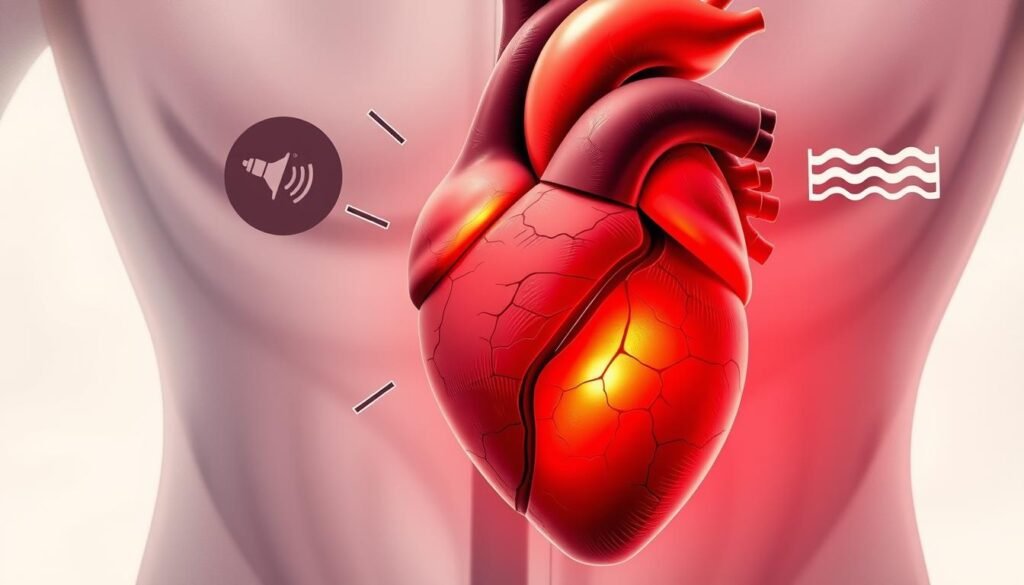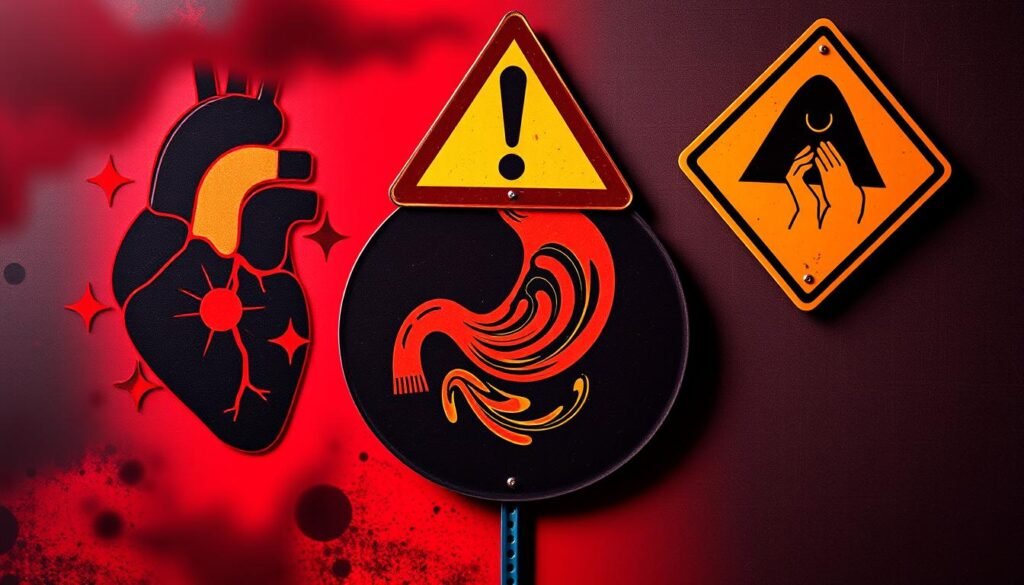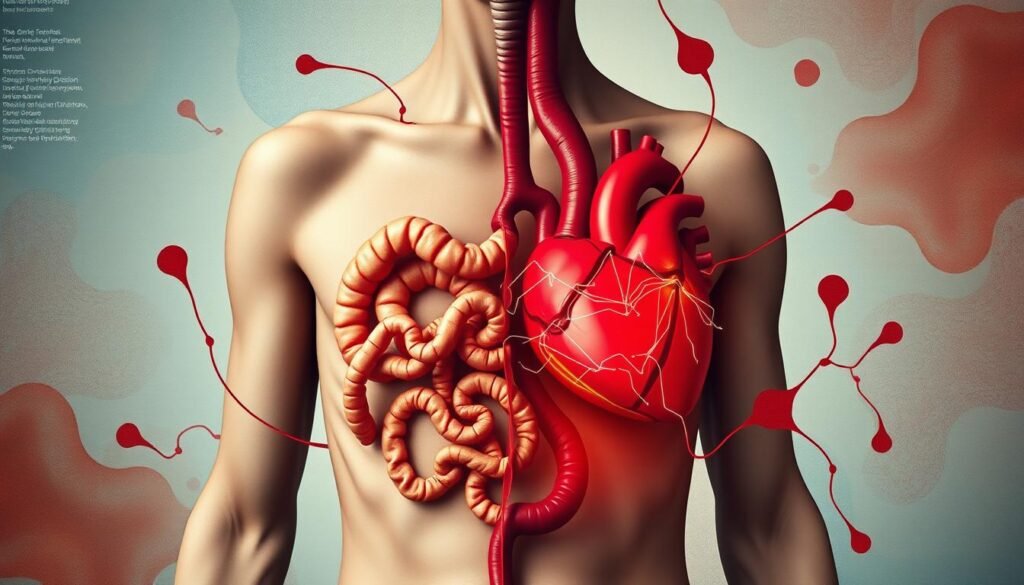Did you know women might have signs a month before a heart attack? Knowing the signs like diarrhea, chest pain, and fatigue is key. They might mean a health problem or that your body is in distress. Spotting these early helps get treatment fast.
People often don’t see the danger of having diarrhea, chest pain, and fatigue together. These symptoms can point to big health troubles. It’s crucial to see their importance. Learning about diseases like Whipple and Campylobacter-related heart issues is wise. Click here for more on chest pain and diarrhea.
Key Takeaways
- Recognizing the symptoms of diarrhea chest pain fatigue can be life-saving.
- Women are less likely to experience classic chest pain before a heart attack.
- Understanding the potential underlying health conditions is vital.
- Immediate medical attention is crucial when experiencing these warning signs.
- Education on rare conditions can enhance health awareness.
Understanding the Symptoms of Diarrhea, Chest Pain, and Fatigue
Diarrhea symptoms include loose, watery stools. They happen often in a short time. This can make you feel very uncomfortable. If it continues, it can also lead to dehydration. Diarrhea can come from many causes, such as food poisoning. Along with diarrhea, you might have stomach cramps and vomiting. Knowing these signs is important to get help on time.
Chest pain can feel different for everyone. It might be sharp or just a dull ache. You might feel this pain with other symptoms like shortness of breath or dizziness. Panic attacks can cause chest pain too, making your heart race. It’s crucial to recognize these signs to deal with any health problems early.
Fatigue makes you feel very tired, weak, and unable to focus. If you feel this way a lot, it could signal heart or digestive issues. Paying attention to symptoms, including diarrhea, chest pain, and fatigue, is important. Knowing what they could mean helps in getting early treatment for better health.
| Symptom | Description | Potential Concerns |
|---|---|---|
| Diarrhea | Loose, watery stools often with urgency | Dehydration, infection, food poisoning |
| Chest Pain | Sharp or dull pain in the chest area | Cardiac issues, panic attacks, gastrointestinal problems |
| Fatigue | Extreme tiredness or lack of energy | Heart disease, chronic infection, digestive disorders |
Potential Causes of Diarrhea
Diarrhea can come from many factors. It’s key to know the causes. Diet, infections, and digestive problems are mainly to blame.
Dietary Influences
What you eat often causes diarrhea. About 20% of people may react badly to certain foods. This can lead to diarrhea and pain. Things like artificial sweeteners and not tolerating some sugars can upset your stomach.
It helps to follow U.S. Dietary Guidelines. For women, this means up to one drink a day. For men, up to two. Probiotics in your diet can also help. They have been shown to lessen diarrhea risks from traveling by 8% and from antibiotics by 52%.
Infections Leading to Diarrhea
Infections are a big cause of diarrhea. Viruses and bacteria can make you sick for a couple of days. Bad food or water is usually the culprit. Parasites can be a problem too, especially where it’s not clean.
If the diarrhea is very bad, it could be a sign of a serious health issue. You might need to see a doctor.
Digestive Disorders
Some people have chronic diarrhea because of long-term stomach problems. Issues like irritable bowel syndrome (IBS) affect a lot of Americans, especially women. About 1.3 million have inflammatory bowel disease (IBD), including Crohn’s disease and ulcerative colitis.
Celiac disease and other conditions can also cause stomach upset. If you often have bad symptoms, it’s important to get medical help. A doctor can check what’s wrong.
Chest Pain: Common Causes and Concerns
Chest pain has many causes, making it important to know the source for proper care. It can come from the heart, stomach, or muscles. Knowing these causes helps us recognize when to worry and what to do next.
Cardiac-Related Causes
Heart problems can be serious when they cause chest pain. This pain might feel like pressure or spread to arms and jaw. Chest pain with nausea could mean heart trouble. Breathlessness and feeling faint are also heart attack signs. High blood pressure, cholesterol, and obesity increase these risks. Always see a doctor if chest pain doesn’t go away.
Gastrointestinal-Related Causes
Gastrointestinal issues lead to a lot of discomfort. Heartburn and gallbladder problems are common causes. Heartburn can cause burning chest pain after eating. Many with irritable bowel syndrome (IBS) also have chest pain, with diarrhea and bloating. This shows why knowing the difference between stomach and heart pain is crucial, especially in emergencies. For more on managing these symptoms, check out ICD-10 codes for fatigue.
Musculoskeletal Issues
Muscles in your chest can hurt from too much exercise, falls, or injuries. This pain can seem like it’s your heart. It’s key to know this to avoid unnecessary panic. Sometimes, the pain comes after hard physical work or lifting.
Fatigue: What It Can Indicate
Fatigue often signals that something might be wrong in the body. Getting to know the causes of fatigue can help find any health issues. These reasons can be physical or emotional, each needing attention and sometimes treatment.
Physical Causes of Fatigue
Many physical conditions lead to feeling tired. Anemia, which means not having enough red blood cells, causes extreme tiredness. Chronic infections like tuberculosis or common viruses can drain your energy over time. Also, thyroid disorders, especially hypothyroidism, can slow your metabolism and make you feel tired all the time.
Other physical causes include:
- Chronic fatigue syndrome
- Sleep apnea
- Diabetes
- Heart disease
Mental and Emotional Factors
Emotional factors are key in chronic fatigue. Conditions like anxiety or depression can make you lose motivation and energy. Stressful times, whether in personal life or work, can make you feel more tired. It’s important to know how these emotional factors affect fatigue to deal with it properly.
Some common emotional factors tied to fatigue are:
- Chronic stress
- Post-traumatic stress disorder (PTSD)
- Burnout from work or family duties
Figuring out the exact causes of fatigue can lead to ways to get better. If you’re always tired and have other symptoms, medical advice is key. It helps speed up recovery and manage health issues well.
Diarrhea Chest Pain Fatigue: When to Seek Medical Help
Feeling diarrhea, chest pain, and fatigue together is worrisome. It’s key to know when to get medical help. These signs might mean something serious. Don’t ignore if these symptoms appear suddenly or are strong.
Symptoms like stomach aches, diarrhea, and fever could mean food poisoning. They might show up soon or after weeks. If they get worse or you feel chest pain, you need to see a doctor fast.
Viral gastroenteritis could also upset your stomach. When this comes with lasting fatigue or chest pain, get checked by a doctor right away.
There are clear signs when to seek medical advice:
| Symptom | Action |
|---|---|
| Severe chest pain | Call emergency services immediately |
| High fever (over 103°F) | Visit a healthcare provider |
| Dehydration signs (thirst, dry mouth) | Seek medical assistance |
| Severe fatigue accompanying chest pain | Consult a physician without delay |
Noticing these signs can raise your chance of getting better. Pay attention to symptoms for clues on how serious it might be. When unsure, always choose to see a doctor. Getting help early can save lives and stop worse problems.
Signs of a Heart Attack
It’s vital to know the signs of a heart attack for quick help. Recognizing chest pain and other signs can save lives. It’s crucial to act fast in these situations.
Chest Pain and Its Characteristics
Chest pain from a heart attack can last over 15 minutes. This pain is often described as:
- Pressure
- Tightness
- Squeezing
- Aching
However, not everyone feels chest pain. This is especially true for older people and those with diabetes. Their signs can be mild or unclear. While movies show heart attacks as sudden, they can begin subtly, even weeks before.
Associated Symptoms to Watch For
Heart attacks are not just about chest pain. Look out for these signs too:
- Upper body pain (spreading to shoulder, arm, back, neck, jaw, or belly)
- Shortness of breath
- Anxiety or lightheadedness
- Excessive sweating
- Nausea or vomiting

Women may notice different symptoms, like nausea or pain in different places. Knowing these signs can boost heart health awareness. Getting help fast, even for mild symptoms, is key. Quick action can save lives and prevent more problems.
Dehydration: A Risk from Diarrhea
Diarrhea can lead to serious dehydration because of fluid and electrolyte loss. Knowing dehydration signs is key, particularly for infants, children, and older adults. Recognizing these signs early can help treat dehydration quickly.
Common Symptoms of Dehydration
Dehydration can cause many symptoms, such as:
- Irritability
- Dry mouth
- Fatigue
- Reduced urination
- Darker urine than usual
- Headache
- Extreme thirst
- Dizziness
- Reduced skin elasticity
In infants and young kids, not crying tears is a clear sign of dehydration. In serious cases, one might also have nausea, vomit, a fast heart rate, or even kidney failure or shock.
Preventive Measures Against Dehydration
Preventing dehydration during diarrhea means drinking plenty of liquids. Good choices include:
- Water
- Broth
- Fruit juices
- Sports drinks
- Coconut water
- Oral rehydration solutions like Pedialyte
Keep hydrated if you’re active. Drink fluids before, during, and after a workout. Drink six to twelve ounces of liquid every 10 to 15 minutes if you’re outside, doing things.
Avoid alcohol and caffeine as they make dehydration worse. Eating foods rich in water and drinking water throughout the day also helps. This reduces dehydration risks from diarrhea.
Important Warning Signs Not to Ignore
Knowing vital warning signs can save lives. For example, constant diarrhea could point to serious health issues. Getting help right away for severe chest pain is essential, as it might be a heart problem. It’s important not to ignore these symptoms.
Feeling extremely tired is often dismissed as stress or not getting enough rest. But it’s not that simple. If this fatigue comes with other issues, like mental changes or big headaches, it’s time to look deeper. These signs could mean more serious health issues.
Here are some important warning signs to be mindful of:
- Chest pain: Women might not have typical heart attack signs. They could feel anxious or very tired along with the chest pain.
- Uncontrolled bleeding: If bleeding doesn’t stop after five minutes of pressure, get help right away.
- Severe headaches: The worst headache you’ve ever had could be a sign of something like meningitis.
- Sudden confusion: A sudden change in how clear you think can mean many health problems that need quick action.
- Visible changes in vision: Any difference in sight could be serious and should be checked out.
Making healthy choices is key to preventing issues. Eating fruits, veggies, and lean meats helps keep you well and might prevent heart problems. Working out for 150 minutes every week at a moderate level is also good for your heart.

Being able to recognize these warning signs means you can act fast. For more details on how vitamins and minerals are crucial for keeping up your health and energy, check out this informative resource.
Seeking Medical Attention: What to Expect
Knowing what happens when you seek medical care can make the experience less stressful. If you have symptoms like chest pain or diarrhea, it’s important to understand the process. The first step is an exam by a doctor who looks at your medical history and symptoms. This helps decide the next steps and any tests needed.
Initial Examination Process
The doctor will ask about your symptoms, how long you’ve had them, and how severe they are. They will then check your physical health. Be ready to talk about:
- Any recent changes in health
- History of chronic conditions
- Medications currently being taken
Being open and honest with your doctor is key. It lets them figure out the best plan for you.
Potential Diagnostic Tests
Doctors might suggest tests to understand your symptoms better. Some common ones include:
- Blood tests: These check for signs of infection and how your organs are working.
- Imaging tests: Methods like X-rays or CT scans show what’s happening inside your body. They can spot issues causing chest pain or stomach problems.
- Electrocardiogram (ECG): This tracks your heart’s rhythm and looks for any odd patterns that might mean heart problems.
These tests help figure out the cause of your symptoms. They also guide talks with your doctor about treatment. Understanding what to expect can help you make informed health decisions.
If you think you’re having a heart attack, get help fast. Spotting the signs early can save your life. For more information, check the early signs of a heart attack.
Understanding Rare Conditions Linking Diarrhea and Chest Pain
Sometimes, the link between diarrhea and chest pain points to rare diseases. ATTR amyloidosis is one such disease, often missed by doctors. Yet, evidence shows it’s more common than we used to think. This condition targets various organs and nerves, affecting the heart and digestion.
ATTR amyloidosis comes in two forms: hereditary and age-related. The hereditary type usually shows up in people around their 50s or 60s. It often hits Caucasian men over 65 when it’s not inherited. Symptoms can vary, combining digestive problems like diarrhea with heart issues like tiredness and swelling.
Whipple disease is another rare condition to know about. It strikes less than 1 in 1 million people. Mostly, it affects middle-aged Caucasian men, especially those working outdoors. Patients often suffer from nutritional problems, causing symptoms like diarrhea and stomach pain.
It’s vital to catch these rare conditions early. Quick medical care can greatly help patients. By understanding how diarrhea and chest pain are connected, doctors can identify and treat these complex conditions better.

Home Remedies and Care Options
People with symptoms like diarrhea, chest pain, and being very tired have many home solutions to try. Changes in what you eat and drinking plenty of fluids are key for getting better and staying healthy.
Dietary Adjustments
Changing your diet can really help your recovery. The BRAT diet, with bananas, rice, applesauce, and toast, is gentle on the stomach. It helps with diarrhea by giving you nutrients that are easy to digest. Eating fermented food is also good because it’s full of probiotics. This can stop diarrhea faster than other treatments can.
- Include bland foods such as plain toast or yogurt.
- Limit alcohol and spicy foods to prevent further irritation.
- Incorporate gut-friendly foods, including bananas and rice.
Hydration Strategies
It’s very important to keep drinking water, especially with diarrhea. You should try to drink eight to ten glasses of water a day. This helps keep your body’s fluids in balance when you are sick. Drinking tea like chamomile might help too, but we’re not sure. Taking probiotics helps your gut and can make diarrhea go away faster.
- Drink sufficient water to counter dehydration.
- Opt for herbal teas or broths for added nutrients.
- Consider electrolyte solutions if severe diarrhea persists.
Using these home remedies with the right foods and drinks can help a lot. They are good for taking care of yourself and work well with other treatments if you need them.
Conclusion
In summary, the link between diarrhea, chest pain, and feeling tired is crucial for our health awareness. These symptoms might seem normal on their own but can point to bigger health issues. A range of factors, including what we eat and some rare health conditions, can cause these symptoms, highlighting the importance of managing them for our well-being.
You shouldn’t ignore these warning signs. Seeing a doctor when needed is important. Keeping an eye out for signs of dehydration and chest pain is key. By getting smarter about these symptoms and taking care of ourselves, we can handle these health challenges better. In the end, focusing on our health and acting fast when problems show up helps improve our health outcomes.